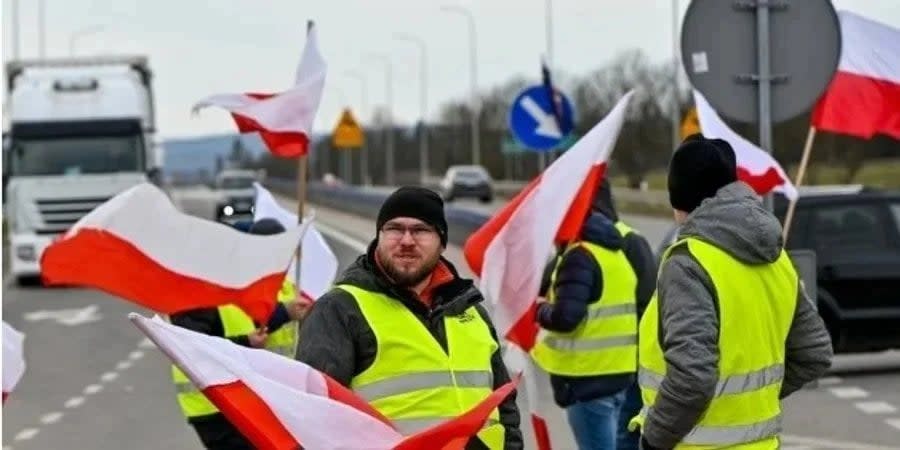Polish farmers protest EU Green Deal, block border with Germany, demand import ban

Polish farmers are blocking the border with Germany at the Świecko crossing point on the A2 highway and near the water crossing in Gubinek, local news agency RMF24 reported on March 18.
The protesters have no plans to suspend the protest, which is expected to last until at least March 21. Several kilometers of queues have formed at the border.
Dozens of tractors and various agricultural machinery have been placed along the roads by the protesters, effectively blocking traffic in both directions toward Poznan and Berlin. Only emergency services are permitted to pass through this area.
Read also: Polish farmers to temporarily unblock key Ukraine border crossing — UA Border Guard
The farmers’ demands remain unchanged: they demand the Polish government’s rejection of the European Green Deal and the blocking of imports of agricultural products from outside the EU, primarily from Ukraine.
“If necessary, we will protest until we achieve our desired outcome, even through the holidays (Easter - ed.), until our voices are heard and our demands fully met,” said Polish protesters at the border.
Read also: Polish minister identifies culprit in border blockade: neither Poland, Ukraine, nor Putin
They declare that the protest will continue until at least the evening of March 20. Additionally, protesters have blocked Highway 32 in the town of Gubinek on the border with Germany. Drivers are being redirected to the S3 highway to bypass the traffic jam, but a backlog of at least 5 km has formed there.
Polish Deputy Agriculture Minister Michal Kolodziejczak stated on March 18 that government officials do not plan to meet with protesters at the border with Germany.
Read also: Police clash as farmers’ protest expands in Poland
Polish protesters began restricting traffic on the border with Ukraine on Feb. 20. Trucks were halted at the Medyka-Shehyni, Dołhobyczów-Uhryniv, Zosin-Ustyluh, Korczowa-Krakivets, Hrebenne-Rava-Ruska, and Dorohusk-Yahodyn checkpoints.
The farmers expressed several demands, including two primary ones: the cessation of duty-free trade with Ukraine and the complete closure of the Ukrainian-Polish border for trucks.
Protesters emptied grain from eight railroad cars carrying Ukrainian agricultural products overnight on Feb. 24-25. This marked the fourth incident in several days. Poland reported it was unable to retrieve all the Ukrainian grain spilled from the railroad cars.
On Feb. 28, Ukrainian and Polish officials held talks regarding the possibility of unblocking the border while considering the interests of farmers.
The European Parliament Committee endorsed the extension of duty-free trade for Ukraine on March 7. Ukraine announced on the same day its readiness to accept trade restrictions with the EU, but on its own terms.
Polish farmers temporarily ceased blocking traffic at the Krakovets checkpoint with Ukraine on March 10. However, protesters are expected to resume the strike at this checkpoint on March 13.
Polish farmers declared on March 11 that they would prevent any trucks from leaving Ukraine through the Zosin-Ustyluh checkpoint.
In addition to the protests on the Polish side, local Ukrainian carriers also initiated a strike on March 18, resulting in delays of perishable goods at the border increasing to seven days.
We’re bringing the voice of Ukraine to the world. Support us with a one-time donation, or become a Patron!
Read the original article on The New Voice of Ukraine
